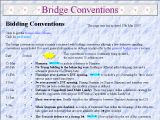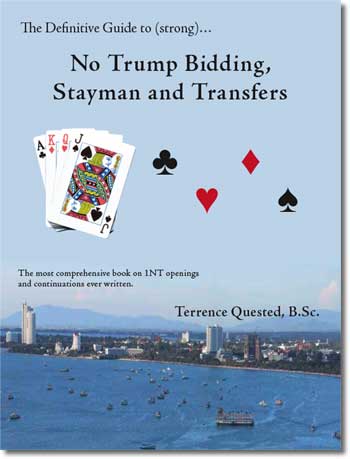Mon 16th 1st Tony H & Kenneth 63% 2nd Dave C & Paul S 61%
Wed 18th 1st Hans V & Janne 65% 2nd Mike G & Terry Q 62%
Fri 20th 1st Georges & Jean-Charles 59% 2nd Bob S & Hans V 58%
| to news-sheet main page |
 |
||||
| to Pattaya Bridge home page |
|||||
 |
to bridge book reviews | to bridge conventions | to No Trump bidding | ||
| to bridge CD's and computer games and software | |||||
Bidding Quiz Standard
American bidding is assumed unless otherwise stated.
Hand A Hand B With Hand
A partner opens 1♠, what do you bid?
♠ A1084 ♠ AK875
♥
AQ ♥ AQJ103 With Hand B you open 1♠ and partner raises to 2♠, what
♦ Q762 ♦ - do
you bid?
♣ Q82 ♣
QJ9
Hand C With Hand C RHO opens 3♠, what do you bid?
♠ 4
♣
KJ532
D 1♣ pass 2NT what
is the 2NT response over a minor?
E 1♥ pass 2NT what is the 2NT response over a major?
Current club championship standings
|
|
Gold Cup = Best 30 |
Silver Plate = Best 10 |
Bronze Medal = Best 5 |
|
1 2 3 4 5 6 7 8 9 10 |
1885.7 Janne Roos 1871.5 Hans Vikman 1860.7 Paul Quodomine |
670.1 657.7 640.1 628.3 Sally Watson 626.8 Tomas Wikman 619.8 Lars Broman 615.9 Jean Wissing 610.7 Johan Bratsburg 610.0 Derek & Gerard 609.5 Duplessy & Coutlet |
344.6 Janne Roos 338.3 Hans Vikman 329.6 Tomas Wikman 325.4 Sally Watson 323.4 Paul Quodomine 322.9 Lars Broman 322.7 Derek & Gerard 320.3 Jean Wissing 319.5 Duplessy & Coutlet 316.0 Sigurd Zahl |
Another Jacoby 2NT Auction – part 1 Board 1 from Monday 9th August
Recently we have had a few deals where a Jacoby 2NT auction can keep you low at 4♥/♠. Here we have a example where the bid led to an excellent slam which was missed using ‘older’ methods.
Dealer: ♠ 52 Table A
North ♥ K74 West North East South
Love all ♦ K62 - pass 1♠ pass
♣
Q10963 2NT (1) pass 3♣ (2) pass
♠ KQ8 N ♠ AJ943 4NT (4) pass 5♣ (5) pass
♠ 1076 West North East South
♥
965 - pass 1♠ pass
♦ 1098 2♣ pass 2♦ pass
♣ J872 4♠ (6) pass pass (7) pass
Table B: (1) This pair do not play Jacoby 2NT and have to
go through the ‘older’ bidding system of a delayed game raise.
(6) So this shows a sound raise to 4♠. However is does not show the extra values.
(7) And East too has a bit extra but does not know
that West has.
And what happened? 6♠= three times, 3NT+3 and 4♠+2 twice. So three pairs missed the 75% slam.
The bottom lines:
- The Jacoby 2NT is a great convention and really helps slam bidding. As we see from this example slam is easily bid using Jacoby, where both West and East can show slam interest; but is very difficult at table B where neither can.
Another Jacoby 2NT Auction – part 2 Board 16 from Wednesday 18th August
Dealer: ♠ KQJ73 Table A
West ♥ KJ76 West North East South(A)
E-W vul ♦ A8 pass 1♠ pass 4♠ (1)
♣
K10 pass pass (2) pass
♠ 962 N ♠ 5 Table B
♠ A1084 pass 4NT (5) pass 5♥
♥
AQ
pass 6♠ all pass
♦ Q762
♣ Q82
Table B: (1) This pair play the Jacoby 2NT in response to a
major suit opening, and this is the answer to question A. It shows at least
opening values and 4-card trump support and no small singleton (otherwise
splinter).
(3) This shows a strong opening with no other
5-card suit and no small singleton.
(4) A cue bid, here showing a ♥ control and denying a ♣ or ♦
control.
(5) RKCB.
And what happened? 6♠= twice and 4♠+2 three times. So three pairs missed the cold slam.
The bottom lines:
-
The Jacoby
2NT is a great convention that really helps slam bidding.
Dave’s Column Here is Dave’s 1st problem, on defence.
♠ K42 N Book
Bidding
♠ A86
♥
K7
♦ J765
♣ AKQJ
You are West,
defending 4♠. East leads the ♥10 and declarer played low from dummy. You win the ♥Q and declarer plays the ♥J. You continue with the ♥A which declarer ruffs. Declarer takes a losing
♠ finesse to your ♠Q, with partner playing the ♠3.
How do you proceed?
Dave’s Column
Answer Board 16 from Wednesday 11th August
Dealer: ♠ QJ10975 Book Bidding
North ♥ J West North East South
E-W vul ♦ K42 - 2♠ pass 4♠
♣
1096 all
pass
♠ K42 N ♠ 3
♠ A86
♥
K7
♦ J765
♣ AKQJ
East leads the ♥10 and declarer played low from dummy. West wins the ♥Q and declarer plays the ♥J. West continues with the ♥A which declarer ruffs. Declarer takes a losing
♠ finesse to West’s ♠K, with East playing the ♠3. How should West proceed?
Fear got the best of today’s West. He knew that the ♦ suit offered the only hope for two more
tricks. What he didn’t realize was that there was no reason to rush to get
them.
North ruffed the second ♥
and took the losing trump finesse. With two tricks in the bag and with dummy’s
solid trumps staring at him. West knew that North’s weak spot was in ♦’s. Accordingly West shifted to a ♦. When North guessed to duck, East had to play
his ♦A, and declarer had no more losers. He drew
trumps and discarded his low ♦ on a ♣.
So how does West conclude that he need not rush to collect whatever he
can in ♦’s?
It’s not that difficult, but West must do some counting. He knows that
North had six ♠’s and just one ♥. That leaves him with six unknown cards in the minors. Unless North
held five or more ♣’s then after he drew trumps and cashed dummy’s
♣’s, he would still have two ♦’s. Therefore, there is no need for West to
panic. Better to exit safely in trumps (or ♣’s) and force declarer to play ♦’s
himself.
After West exits calmly and safely with a black card at trick four,
North cannot avoid two ♦ losers. Forced to
play the suit himself, he cannot escape and must go one down.
And what happened at the Pattaya bridge club? 4♠= three times, 3♠+1 and 4♠-1. So it appears that just one pair defended
correctly and did not attack ♦’s, and that was
against Janne & Hans – well done the non-fearful John & Marnie.
The bottom lines:
- This is a typical example of
whoever breaks a suit loses a trick – typically when all players hold one
honour card in the suit.
Dave’s 2nd
Column Here
is Dave’s 2nd problem, again on declarer play.
West East Book Bidding
♠ J1096 ♠ AK875 West North East South
♣
K107 ♣ QJ9 4♠ all
pass
You are East, declarer in 4♠. South leads the ♦J to the ♦Q
and North’s ♦A, which you ruff. A ♦ comes back which you win, discarding a ♥ from hand. You lead the ♠A and North shows out.
East ♥ 98 the ♣Q.
South wins the ♣A and leads another ♦ to
Both vul ♦ 76 dummy’s ♦K and you discard a ♥. You then take a ♥
♣
854 finesse but South wins and punches with another
♦.
♥
6
♦ 10
♣ 62
Dave’s 2nd Column Answer Board 26 from Wednesday 18th
August
Dealer: ♠ - Book Bidding
East ♥ 985 West North East(B) South
Both vul ♦ A76432 - - 1♠ pass
♣
8543 2♠ pass 3♥ (1) pass
4♠ all pass
♠ J1096 N ♠ AK875
♠ Q432 (1) What did you bid with this East hand B in this
♥
K6 week’s
quiz? I also made this 2♥ bid, not as a
♦ J1098 game try (I was always bidding game),
but to
♣ A62 perhaps
uncover a superior ♥ fit.
East ♥ 98 another trump won’t work. South will win his ♠Q
Both vul ♦ 76 to lead
another ♦, forcing dummy’s last trump and
♣
854 promoting South’s last trump to the setting
trick.
♥
6 crosses
to dummy in ♣’s to draw South’s pesky
♦ 10 trumps. And
is South refuses to win his ♠Q,
And what happened at the Pattaya bridge club? Five
different results! 5♠*-1, 4♠-1, 2♠+2,
4♠= and 4♠+1.
2/1 make slam bidding easy Board 5 from Wednesday 11th August
Our top pair reached the easy 6♥ slam here at table A, but I don’t like their methods!
Dealer: ♠ Q63 Table A
North ♥ KJ10987 West North East South
N-S vul ♦ A10 - 1♥ pass 2♣
♣
K4 pass 2♥ pass 4NT (1)
♠ K105 N ♠ J942 all pass
♥
AQ6 pass 2♥ pass 3♥ (3)
♦ 87 pass 4♦ (4) pass 4NT (5)
♣ AQJ95 pass 5♥ pass 6♥
All pass
Auction (2) Yes! Play 2/1. This 3♥ bid is game forcing playing 2/1.
Playing 2/1(3) Game
forcing, showing three ♥’s and slam
interest. 4♥ would show a weaker hand and 4NT is a bid that
would hardly ever be used.
(4) With this monster (just look at the solidity of
this ♥ suit) North obviously cue bids the ♦A.
(5) And now South can bid RKCB in complete
confidence, knowing that partner has a ♦
control.
And what happened? 6♥+1 three times, 4♥+3 twice.
The bottom lines:
-
The 2/1
bidding system gives you more bidding space to sensibly investigate slam.
Ace in their pre-emptive suit Board 2 from Monday 9th August
Dealer: ♠ 8 Table A
East ♥ KQ1085 West(C) North East South
N-S vul ♦ 7653 - - - 3♠
♣
A98 5♦ (1) all
pass
♠ 4 N ♠ A1063 Table B
♠ KQJ9752
♥
J763
♦ 8
♣ 10
Table B: (1) This is much better than the 5♦ bid, but is not perfect because partner is
likely to bid 4♥ and then a 5♣ bid by you may be construed as a ♣
hand rather than a minor suit two-suiter. I guess that this is up to
partnership agreement.
(2) East
is minimum for a 3NT bid, but the ♠Axxx
are really great. This is because the ♠A
can be held up for a round if necessary and hopefully South will have no entry
for his long ♠’s.
And what happened? 6♣=, 3NT+2, 5♦=, 3♦+1 twice and 3♦+2.
The bottom lines:
-
The ace in
their long suit is very important as you can safely hold up as necessary. Here
it was very important as declarer could safely win the first ♠ lead and knock out the ♣A before the ♥’s were attacked.
- 6♣ and 3NT are both good contract and both will only fail on an initial ♥ lead.
Bidding Quiz Answers
D 1♣ pass 2NT This
is best played as 10-12 with no 4-card major.
F 1♥ pass 2NT This is best played as the Jacoby 2NT.


